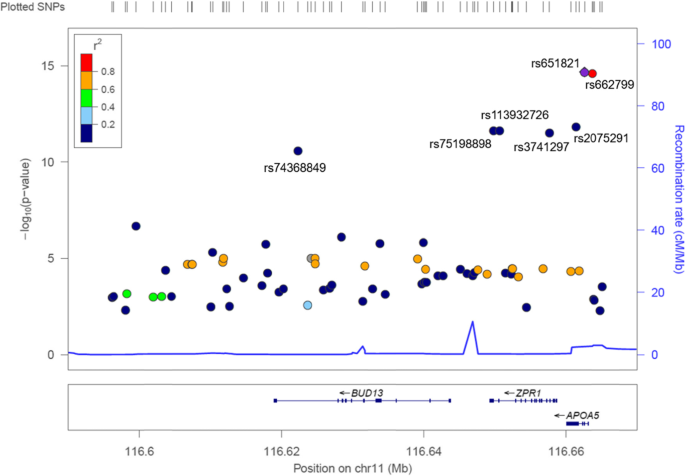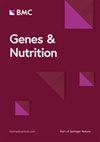韩国成人代谢综合征发病率与红肉和加工肉消费与APOA5基因变异之间的相互作用
IF 3.5
3区 医学
Q1 Medicine
引用次数: 0
摘要
代谢综合征(MetS)以糖尿病、高血压、高脂血症、肥胖等疾病共存为特征,并受遗传因素影响。先前的全基因组关联研究(GWAS)表明,APOA5基因变异与MetS及其组分显著相关。饮食因素,如食用红肉和加工肉,可导致慢性疾病,包括高血压、糖尿病和血管抑郁症。本研究的目的是研究APOA5 rs662799多态性与红肉和加工肉消费之间的相互作用对MetS发病率的调节。在这项前瞻性队列研究中,从2001年至2016年韩国基因组与流行病学研究(KoGES)的韩国协会资源(KARE)队列中收集了3266名参与者。APOA5 rs662799多态性采用韩国芯片进行GWAS提取。使用半定量食物频率问卷评估红肉和加工肉的消费数据。携带rs662799次要G等位基因(AG + GG)和食用红肉和加工肉的第三分位数(日份数)的人患met的几率高于携带rs662799主要等位基因(AA)和食用红肉和加工肉的第一分位数的人(HR 1.70, 95% CI 1.30-2.22, p互作= 0.002)。在韩国成年人中观察到rs662799小等位基因的存在与大量食用红肉和加工肉制品以及MetS的发病率之间存在关联。本文章由计算机程序翻译,如有差异,请以英文原文为准。

Interactions between red and processed meat consumption and APOA5 gene variants associated with the incidence of metabolic syndrome in Korean adults
Metabolic syndrome (MetS) is characterized by the coexistence of disorders such as diabetes, hypertension, hyperlipidemia, and obesity and is affected by genetic factors. Previous genome-wide association studies (GWAS) suggested that APOA5 gene variants were significantly associated with MetS and its components. Dietary factors such as red and processed meat consumption can cause chronic diseases, including hypertension, diabetes, and vascular depression. The aim of this study was to investigate the modulation of the incidence of MetS by the interaction between APOA5 rs662799 polymorphism and red and processed meat consumption. In this prospective cohort study, 3266 participants were collected from the Korea Association REsource (KARE) cohort of the Korean Genome and Epidemiology Study (KoGES) from 2001 to 2016. APOA5 rs662799 polymorphism was extracted by GWAS using the Korean Chip. Red and processed meat consumption data were assessed using a semi-quantitative food frequency questionnaire. The incidence of MetS in carriers of the minor G allele of rs662799 (AG + GG) and the third tertile of red and processed meat consumption (serving/day) was higher than those with the major allele of rs662799 (AA) and the first tertile of red and processed meat consumption (HR 1.70, 95% CI 1.30–2.22, p interaction = 0.002). An association between the presence of the minor alleles of rs662799 and high red and processed meat consumption and the incidence of MetS was observed in Korean adults.
求助全文
通过发布文献求助,成功后即可免费获取论文全文。
去求助
来源期刊

Genes and Nutrition
Biochemistry, Genetics and Molecular Biology-Genetics
CiteScore
7.90
自引率
0.00%
发文量
14
审稿时长
13 weeks
期刊介绍:
This journal examines the relationship between genetics and nutrition, with the ultimate goal of improving human health. It publishes original research articles and review articles on preclinical research data coming largely from animal, cell culture and other experimental models as well as critical evaluations of human experimental data to help deliver products with medically proven use.
 求助内容:
求助内容: 应助结果提醒方式:
应助结果提醒方式:


